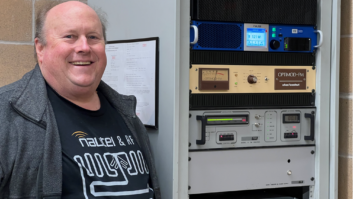The Department of Justice announced today the conclusion of its investigation into proposed modifications to the antitrust consent decrees binding the American Society of Composers, Authors and Publishers and Broadcast Music Inc. It determined that no modifications are warranted at this time. In other words, nothing is going to change concerning antitrust and performance royalties questions.
The National Association of Broadcasters immediately issued a statement of approval. NAB President and CEO Gordon Smith said, “Local radio and television broadcasters strongly support the Justice Department’s decision not to modify the ASCAP and BMI consent decrees. We appreciate the hard work of the DOJ during its diligent, comprehensive review and believe that this decision will ensure that ASCAP and BMI continue to fairly and efficiently license musical works in a manner that is pro-competitive.”
He held out an olive branch to the PROs: “Broadcasters look forward to continuing our close relationship with these performance rights organizations, which have worked to the mutual benefit of songwriters, music licensees and listeners around the world for decades.”
However the performance rights groups were not happy at all, promising to fight the decision in court.
BMI President and CEO Mike O’Neill responded, “The DOJ’s interpretation of our consent decree serves no one, not the marketplace, the music publishers, the music users, and most importantly, not our songwriters and composers who now have the government weighing in on their creative and financial decisions.” He focused in on the changing media world and how keeping the status quo might not be a solution. “Unlike the DOJ, we believe that our consent decree permits fractional licensing, a practice that encourages competition in our industry and fosters creativity and collaboration among music creators, a factor the DOJ completely dismissed,” he said.
Here is its legal response letter.
According to a release, ASCAP will take the lead in appealing to Congress for a legislative solution.
ASCAP CEO Elizabeth Matthews added her organization’s interpretation: “The DOJ decision puts the U.S. completely out of step with the entire global music marketplace, denies American music creators their rights, and potentially disrupts the flow of music without any benefit to the public. That is why ASCAP will work with our allies in Congress, BMI and leaders within the music industry to explore legislative solutions to challenge the DOJ’s 100% licensing decision and enact the modifications that will protect songwriters, composers and the music we all love.”
The bone of contention is a recently initiated modification to the original consent decree requiring that songs to be licensed be 100% controlled by a performance rights organization. This is in comparison to the traditional “fractional” system wherein rights to a song might be split between several song authors who might belong to different performance rights organizations. If a song is “split” between rights holders it might not be licensable.
“[The Dept. of Justice] … decided to implement a new requirement mandating that each PRO [Performance Rights Organization] license songs in their respective repertoires on a 100% basis — upending the long-standing industry practice of fractional licensing and creating logistical and legal challenges that didn’t previously exist for hundreds of thousands of music creators across the country,” BMI’s legal appeal states.
ASCAP President Paul Williams fired off a letter to members. “[R]ather than updating the antiquated framework of laws that govern how songwriters license their work and tackling some of the biggest challenges facing the music industry, the DOJ chose to avoid a solution at this time and maintain the current decrees. The DOJ also announced that it plans to upend decades of industry practice by imposing new ‘full work’ or ‘100% licensing’ requirements on the PROs, despite very public opposition to this proposal.,” he said. His letter is here.












